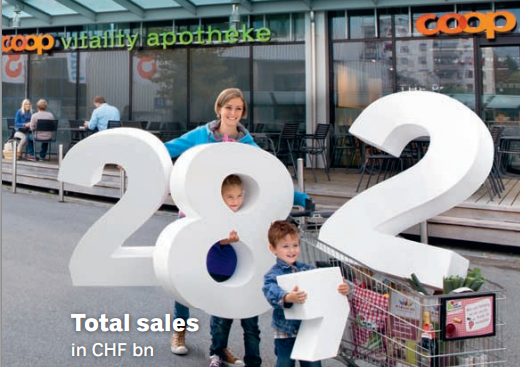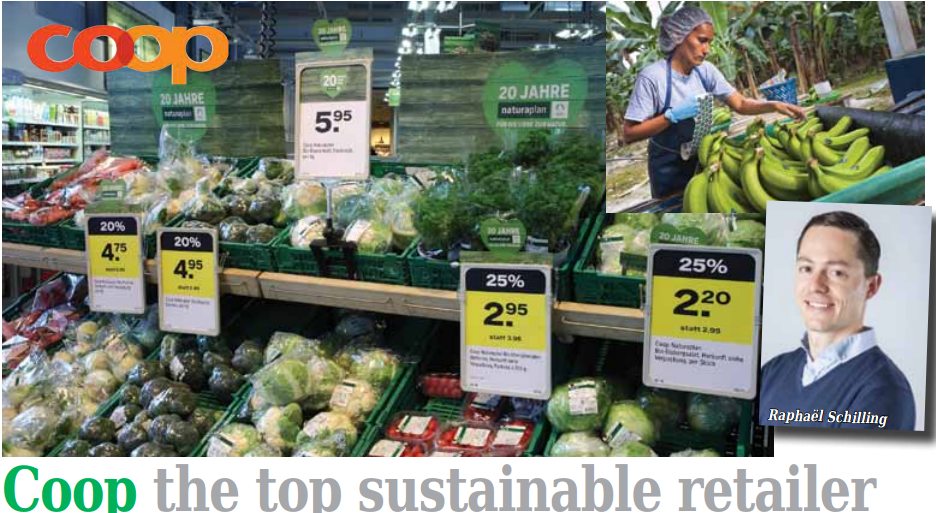Coop Group focused on sustainability and variety – and online sales

Switzerland’s Coop Group says sustainability and variety are its leitmotif for 2015
Despite a difficult environment, total sales for the internationally active retailer and wholesaler last year inched up 1.4% on 2013. And this year it aims to repeat the feat.
“The supermarkets will focus mainly on sustainability and variety in 2015, when the Coop Group again aims to achieve above-average growth through the online formats Coop@home, Microspot.ch and Nettoshop.ch and the numerous other online shops,” the Basel-based group said in its 2014 annual report, published February 17.
“The Coop Group also aims to more closely combine bricks-and-mortar and online trading through cross-channel solutions.”
“Sustainability, variety, quality and pricing performance continue to be the attributes by which it positions itself,” it said.
The report shows the group – which claims to have the densest network of sales outlets in Switzerland – ran about 1970 retail outlets (supermarkets and specialist retail formats) and 199 in wholesale last year.
Strong growth in online business
Coop described its online business as a strong growth market, one in which its net sales exceeded one billion francs for the first time last year. “Online shops in the retail sector lifted sales 52.4%, while online sales in the wholesale business grew 10.4%,” it said.
Wholesale and production business areas: shift from cash & carry to wholesale supplies
The group’s wholesale operations are conducted through the Transgourmet Group, while the Bell Group and the Coop manufacturing companies comprise its manufacturing operations.
“In the wholesale/production segment, the potential for further growth lies in integrating activities across Europe. Political developments in Russia, including the weakness of the rouble, and the difficult economic trend in Romania pose a challenge.
“In wholesaling, the ongoing shift from cash & carry to wholesale supplies continues. The Transgourmet Group is systematically pursuing its chosen multi-channel strategy, i.e. combining cash & carry and wholesale suppliers, thereby further boosting wholesale supplies. Transgourmet continues to expand its market position by implementing a transnational own brand strategy,” the report said.
Retail: ‘greatest product range diversity in Swiss food retailing’
The group’s retail business spans the Coop Cooperative with its supermarkets and specialist formats, plus subsidiaries.
In 2014, growth In the retail segment was driven especially by the Interdiscount and Microspot.ch formats as well as by the 2014 acquirees Marché Restaurants Schweiz AG and RS Vertriebs AG with the Nettoshop.ch und Schubiger sales brands.
Stocking more than 40,000 items, Coop claims to offer “the greatest product range diversity in Swiss food retailing” with “manufacturer brands, affordable own-label brands, sustainable products or articles for people with allergies or for vegetarians.”
In 2014, Coop expanded its selection of regional and local products – now sold under its new Miini Region quality seal – and numerous sustainability ranges were extended, for instance the own-label sustainability brand Ünique.
Own-label sustainability brands & quality labels include:
Ünique – Comprising high quality carrots, a vegetable mix and now also cucumbers, Ünique has been marketed in Coop supermarkets since 2014 as an own-label sustainability brand, underpinning Coop’s view “that entire harvests should be utilized and not just parts of them.”
Pro Specie Rara – Parsnips were extremely popular among the vegetables in this line sold by Coop last year. Since 1999 it has been working with the Pro Specie Rara Foundation to maintain the biodiversity of Swiss farming.
Swiss no. 1 in organic
Coop says it is the market leader for organic products, with one in two organic products sold in Switzerland purchased at its stores.
Most of its organic food products are marketed under the Naturaplan own label brand, which posted sales of 1.1 billion francs for organic products in 2014, up 2%. For its organic products, Coop uses the Bio Suisse bud emblem.
Hochstamm Suisse: preserving heritage fruit trees
Since 2008, Coop has worked closely with the Hochstamm Suisse association, which is dedicated to maintaining and fostering standard fruit-tree orchards in Switzerland. These comprise a wide range of fruit varieties and provide habitats for endangered animals. Coop currently stocks around 40 products made entirely from Swiss Hochstamm fruit, including apple and pear juices.
Convenience foods
The Betty Bossi brand of fresh convenience foods – which Coop said is Switzerland’s most successful such range – is sold exclusively by it. In 2014, Coop launched around 150 new Betty Bossi products, for the first time including items to consume warm while “on the go”. In autumn, the “let’s cook” line was launched, comprising pre-prepared vegetables, ready-made sauces and pre-cooked side dishes, making “healthy home cooking easy and without any need to chop and peel.” Coop generated sales of 470 million francs with Betty Bossi products in 2014, up 2.2% on 2013.
Primagusto: first-class fruit and vegetables
Fruit and vegetables with particularly intense flavour are chosen for the Coop own brand Primagusto, which now comprises 42 seasonal products. In 2014, it posted sales of 21 million francs and growth of 26.9%.
Exotic fruit ripening
Among Coop’s manufacturing companies is Banana Ripening Plant Services, with activities including the sourcing, ripening and packaging of bananas and exotic fruit.
Last year it stored and order-picked six banana and three pineapple varieties, in addition to mango, avocado and 42 varieties of dried fruit and nuts, delivering a total of 22,870 tons of bananas, 1,569 tons of dried fruit and 4,256 tons of exotic fruit (pineapples, mangoes, avocados).
The share of bananas bearing the Fairtrade Max Havelaar quality label in the overall banana range rose to nearly 90% and the Banana Ripening Plant increased the share of organic items in its total output to nearly 35% in 2014.
source: Coop Group’s 2014 annual report:
Coop Group key figures for 2014
Total sales: 28,174 CHF million (+ 1.4%)
Net sales: 27,163 CHF million
Net sales in Switzerland: 19,821 CHF million
Net sales abroad: 7,341 CHF million (48.7% generated in Germany)
Net sales from online shops: 1,124 CHF million (+24.1%)
Profit: 470 CHF million (1.7% of net sales)
Employees: about 77,000 (46,270 in retail)
Based in: Basel, Switzerland
Parent: Coop Group Cooperative
Number of sales outlets
Retail: 1,971 (+38)
No. of Coop supermarkets: 837
Wholesale/Production: 199
Read the report here.

